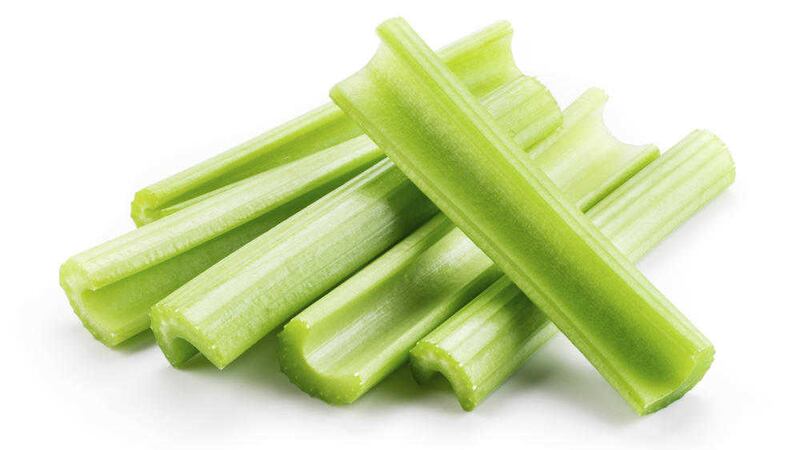THE more you study human nutrition the more obvious it becomes that the amount and the type of vegetables that you eat are vital for maintaining and improving health.
Winter time is great for changing over to the more robust root vegetables such as carrot, parsnip, turnip, swede, sweet potatoes, and leafy vegetables like red cabbage, kale and of course Brussels sprouts, this year’s trendy vegetable. These vegetables tend to have very good quantities of vitamin A or beta carotene, as well as some iron and calcium, although of course each vegetable has its own specific nutrient strength.
One really useful vegetable to aim to have regularly is celery. It has long been recommended to help lower blood pressure – but that is not it’s only strength. It is thought to also lower your risk of cancer. Celery contains compounds that help repel cancer cells, so eating celery, as with many vegetables, can be a natural cancer preventative.
The extensive health benefits of celery might surprise you. A member of the Apiaceae (also known as Umbelliferae) family – which also includes parsley, carrots, fennel, coriander, parsnips and cumin – it has been known for its medicinal properties since the ninth century.
Celery contains the compounds apigenin and luteolin, both bioactive flavonoids that fight cancer cells. Flavonoids are naturally occurring plant pigments that work as antioxidants and have the capacity to combat free radicals in the body.
The apigenin component of celery is thought to fight cancer cells by inducing apoptosis programmed cell death, which causes the cancer cells to self-destruct. In addition to apigenin’s antioxidant and anti-tumor properties, it is traditionally used in Chinese medicine for its capacity to treat of cancer cells, specifically colorectal cancers. In developed nations, colon cancer is the second most frequent cause of cancer-related death.
Like apigenin, luteolin possesses strong anti-inflammatory properties. Both luteolin and quercetin, another flavonoid, are believed to reduce the inflammatory response to allergens. Luteolin reduces inflammation, such as that associated with gout and some arthritic conditions. It is a powerful anti-inflammatory compound with the potential to be as effective as some commercial anti-inflammatory drugs.
A water-loaded vegetable, celery is useful post-workout because it replaces the electrolytes in your body. It is also a rich source of potassium and sodium, giving it a mild salty taste. A one-cup serving of celery juice contains only 65 calories, making it nutrient-dense, so stick it into a smoothie with some spinach or kale, an apple and a beetroot for an amazing energy boost.
The celery plant is naturally rich in vitamins and minerals such as: A, C, K, folate, molybdenum, potassium, fiber, and other healthy components. It is one of many natural alkaline-forming foods (which are usually vegetables). Eating celery reduces your body’s acid levels, helping you to maintain a balanced pH. If your pH level is too acidic, it can stimulate the growth of cancer cells, as well as exacerbating many pain conditions. Studies have shown that cancer cells thrive in an acidic environment.
Celery is also a good source of fibre, which helps lower cholesterol levels by “sweeping” the cholesterol present in the bloodstream. It also contains pthalides, a substance that stimulates the secretion of bile juices that reduce LDL cholesterol. The pthalides relax the arterial wall and dilate the blood vessels, allowing blood to flow without interruption.
Dating back to Hippocrates, celery has been used to treat nervous disorders. If you are suffering from insomnia or anxiety, a cup of celery juice provides a soothing and calming effect on your nerves. Celery has diuretic and cleansing properties which improve overall kidney function. Regular and frequent urination helps eliminate toxins within the body and prevent the formation of kidney stones. Just don’t take it at night – needing to pee is, of course, not a great aid to sleep!
Try this winter warmer recipe to increase your celery intake.
LEEK AND POTATO SOUP
1lb leeks, washed and sliced
1lb potatoes peeled and cubed – Rooster or Maris Piper are good, as they don’t break up
2 sticks of celery
2oz/50g butter
1 pint of vegetable stock
¼ of a freshly grated nutmeg or 2 teaspoons already grated nutmeg
Plenty of black pepper
Melt butter in a heavy-based pan; sauté leeks and celery for 10 minutes very gently. Add in potatoes, toss well and sauté for another 5 minutes.
Add in pepper and nutmeg; add stock and cook for 45 minutes. Adjust seasoning. The large amount of nutmeg makes this soup really rich and hearty. Keep it chunky; don’t be afraid of the nutmeg; keep tasting and adding it until it suits your palate. The addition of nutmeg increases the mineral and vitamin content of this soup – an extraordinary spice, its volatile oils have antioxidant, antifungal, and antidepressant functions.
r.armstrong@irishnews.com



